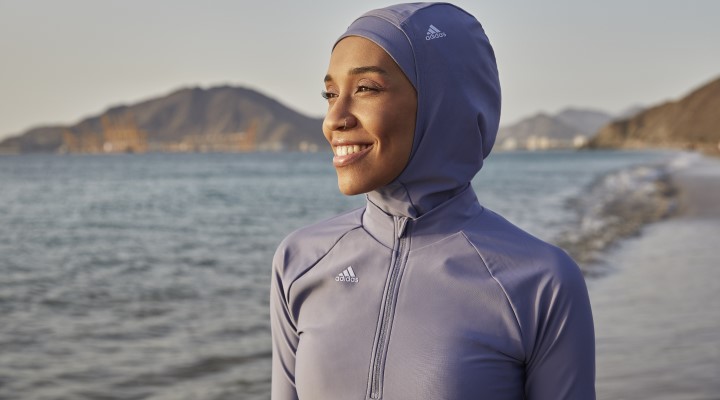Sportswear retailer Adidas is advancing efforts to be more inclusive to shoppers globally with the recent launch of its Burkini Collection. The swimwear range is designed to provide women with more coverage in the water, with items including headscarves, pants, long sleeved tops and hijabs, made from lightweight, chlorine-resistant fabric. “Our belief is that nobody should be prevented from enjoying the benefits of being in and around the water, hence the recent launch of our diversified
ied product offering for all women and our Burkini Collection,” Amrith Gopinath, senior brand director Adidas GCC, said in a statement.
“Each piece is also carefully crafted to ensure that additional fabric does not reduce a swimmer’s ability to move in the water. The range went through a detailed testing process with consumer groups across multiple regions to help find the perfect balance of fit, features, performance and coverage.”
To mark the launch, Adidas unveiled the world’s first ever liquid billboard in Dubai in the form of a five-metre high and three-meter deep swimming pool. The brand enlisted Adidas ambassador and amputee triathlete Dareen Barbar as well as Raha Moharrak, the first Saudi Arabian female to climb Mount Everest, to lead the activation dubbed “Beyond the Surface,” to reinforce the brand’s inclusive approach to sport.
Safa Ali, a Mys Tyler contributor, fashion designer and stylist, described the launch of the collection as “really significant and exciting”.
“The burkini is an important piece that meets the needs of Muslim women in practicing their activities and enjoying their lives. I believe that Adidas will support the idea of women’s freedom to choose what they want and how to express themselves in the way that suits them,” she told Inside Retail.
“Bringing the burkini into mainstream fashion also shows its versatility as the burkini is not limited to veiled women only, as there are some people who do not like to acquire a tan for their skin or who are so sensitive to the sun.”
$277 billion market
A YouGov survey commissioned by Adidas in 2021, found that only 12 per cent of women in the United Arab Emirates (UAE) are completely comfortable wearing a swimsuit in public, with body shame and lack of privacy the top reasons cited.
Emily Pask, founder and creator of Australian swimwear brand Modest Mermaid, agreed that many women globally are struggling with these issues.
“For many of our customers it’s for religious reasons they want to cover up and don’t feel comfortable in public unless they are covered up,” she said.
Pask previously worked in fashion buying for large global fashion brands before embarking on her own business journey.
“I felt women who require modesty were not satisfactorily being catered to in the modest swimwear market. When I started Modest Mermaid in 2018 I was shocked about the lack of options there were for women in the modest swimwear market,” she told Inside Retail.
“Muslim fashion is definitely having more of a moment these days, each year more and more modest brands are starting as well as some of the mainstream brands seeing the growing need to cater to this US$277 billion dollar market that can no longer be ignored.”
Combating segregation
Doris Jablonsky is national distribution manager Australia and New Zealand for German swimwear company Adolf Riedl. Brands include Sunmarin which offers a line of burkinis.
She said there is a big market for modest swimwear but that it’s not easy to reach.
“A big brand can make all the difference,” she said of the Adidas launch.
“I think it is great that a brand like Adidas is taking this approach, it will help to reduce prejudices and make it more mainstream.”
While the primary motive with burkinis is to make women feel comfortable and fashionable, Jablonsky believes they should not only be targeted at Muslim women. She would like to see less segregation in fashion, with clothing for all people, style and religious preferences hanging side by side.
“I would love to see that we all would mingle more and that we would accept each other for what we are – human beings,” she said.
Adidas’ burkini collection is sold globally through its e-commerce site, but Jablonsky highlighted some challenges for retailers selling through bricks-and-mortar retail.
“One of the problems when selling burkinis is that some women would not tolerate any man in the shop. That makes it very difficult for many retailers to branch out into burkinis,” she said.
For Ali, the challenges for Adidas centre around acceptance of the burkini in some countries.“Some Arab countries still refuse to wear the burkini … They think that it will cause diseases or that it is made of fabrics that are not suitable for water. I think it will be important for Adidas to take into account these factors moving forward,” she said.

